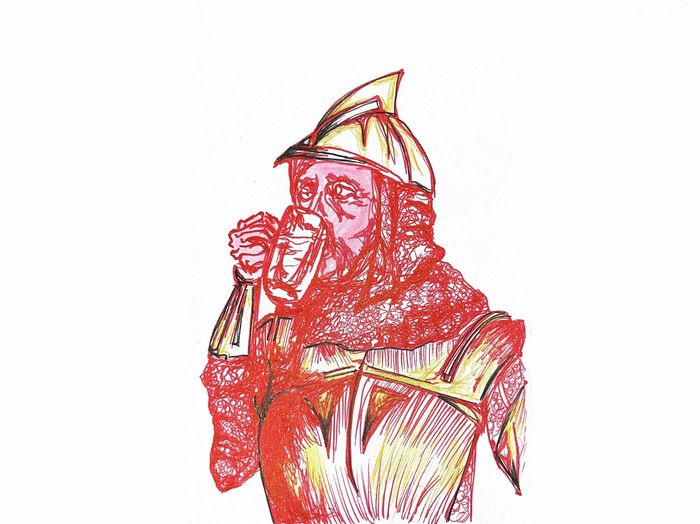Mead after midnight and clerically-cosplayed pub crawls at ASNC soc
Fred Upton reflects on his time with the ASNC Society and what other Cambridge Clubs can learn from it (starting with more battle re-enactments in society termcards).

One icy evening, in the dead of winter, a hearty feast was brewing. A great hall had been decked with candlelight and choir song as rows of long tables, stretching the room, played host to food and revelry: the bench-talk of old colleagues and new partners. At one end of the tuneful hall, the high table seated the eldest of the occupiers, until their leaders, past and present, rose up and shared around an enormous drinking horn, dispensing golden salvos of mead. Needless to say, this year’s ASNC Society Black Tie Dinner spared no expense.
Almost four years ago, Helena Fox wrote a love letter to the ASNC (Anglo-Saxon, Norse, and Celtic) department; I would highly recommend it if you seek the gist of everything the department and society has to offer. Here, though, I would like to talk about what the consistent success of the ASNC Society means for the ideals of a student society as a whole.
“Whenever I ask people how many ASNC students they’ve seen, they rarely answer with more than two”
You may have heard of the ASNC Society in nascent rumours, perplexing tales, or maybe you haven’t heard of them at all. I wouldn’t blame you. ASNC as a degree is often so awfully off the Cambridge radar that it’s lucky to even appear on any given “Cambridge subjects as ...” Camfess post. Over the course of three years, whenever I ask people how many ASNC students they’ve seen, they rarely answer with more than two: the first being myself, and the second being an inexplicable medieval monk from across the room at a Halloween party, which usually ends up being me as well.
But despite this, ASNC is a phenomenon that demands attention. It demands that attention as soon as you see the alphabetical list of Cambridge degrees. “Look at me!” ASNC says: “Gaze upon my incredibly long name, bejewelled with its commas and hyphens,” before falling into the rapids of human memory. There is a reason for this: the department is small. Very small. But that smallness makes it concentrated, and so the close quarters dialogues on Irish law codes or Norwegian trade routes inevitably grew into a society that functions comfortably as a place for people of like-minded passions. It even draws in people from other degrees like History, English and Archaeology. However, it’s a society that’s unlikely to grow beyond its boundaries. Despite all the extra miles it chooses to go, figuratively and literally, the society begins and ends with at least a semi-interest in the medieval world.
“What makes the ASNC Society stand out is its weird and off the wall events”
However, the society has its fair share of activities, of which are optional for all members. There’s the weekly pub gathering and annual Black Tie Dinner, but every society has something along those lines. What makes the ASNC Society stand out is its weird and off-the-wall events that are at least lightly tethered to the degree. Several saints from back in the day* have inspired picnics, sword fights on Castle Mound, and some clerically cosplayed pub crawls. There’s the Yule Play, an ASNC-themed sketch show, which is written and performed for a stressfully large audience. There’s the Lent Term trip which usually takes members to important historical places like Iceland, Dublin, and the Isle of Man. There’s even a football team which is always eager for matches with other societies. Also, there’s the termly magazine, Gesta Asnacorum, which features the highlights of the term.
These facets may seem like a busy collage of things for a society to do, falling under a raft of things other societies may already do, but it’s why I love this society so much: it tries to accommodate for different relationships with the degree. For instance, there are several events associated with alcohol, but there are plenty that aren’t so that students from different walks of life can still come together under this broad spectrum of ASNC. It all depends on what the society means to them. Naturally, this means it can be interpreted individually – with traditions being created and removed every year, depending on members’ wishes. I think this is something admirable for a healthy society to function, especially once it reaches enough traction. But it’s, of course, not for everyone.
Overall, my time at Cambridge has been all the better because of the ASNC Society and its fellow members. After I’ve graduated, when I happen to use the free mug that came with the membership, I will miss the meetings, the events, and the discounted mead. But I will invariably wish them all the best.
*The Saints are, respectively, Dunstan, Rumwold, and Edward.
 Interviews / You don’t need to peak at Cambridge, says Robin Harding31 December 2025
Interviews / You don’t need to peak at Cambridge, says Robin Harding31 December 2025 News / Unions protest handling of redundancies at Epidemiology Unit30 December 2025
News / Unions protest handling of redundancies at Epidemiology Unit30 December 2025 Comment / What happened to men at Cambridge?31 December 2025
Comment / What happened to men at Cambridge?31 December 2025 Features / ‘Treated like we’re incompetent’: ents officers on college micromanagement30 December 2025
Features / ‘Treated like we’re incompetent’: ents officers on college micromanagement30 December 2025 Theatre / We should be filming ADC productions31 December 2025
Theatre / We should be filming ADC productions31 December 2025









